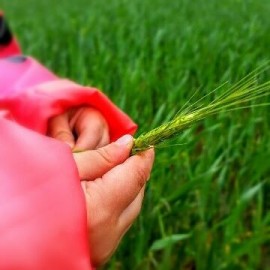By Jenny Burgess on April 26, 2016
Is wheat bad for you?
Get your answer here

We’ve been keeping busy on the farm since the last time I posted. With warmer weather comes busier times. I think everyone has sighed in relief from the recent rains we received. Especially those who, like us, have wheat. It was starting to go downhill fast with the lack of drink from Mother Nature.
Like with any crop, we’ve been walking our fields to see what is needed. Everyday things can change.
We look for things like pests, disease or damage done by Mother Nature herself. Sometimes we can fix this by using certain chemicals like insecticides, herbicides or fungicides. Those are a lot of confusing words, I know.
In this post, I’d like to talk about one herbicide, glyphosate, because I've heard some saying wheat is bad for you when this chemical is used.
We are starting to see, because of lack of moisture from the previous months, thinning of the wheat crop. It’s reminding me of our 2014 crop--when the wheat matured and was ready to be cut, but it kept raining. This caused some problems.
First we couldn’t get into the field to harvest because it was too wet. We also had weeds begin coming up through the thin patch of wheat. It was getting taller than some of our wheat! The weeds were too much for our combine to cut with the wheat. What did we do? We sprayed glyphosate. After we sprayed,we waited eight to 15 days before harvested the crop.
We sell our wheat to a local elevator and they will not take the wheat until these days are met. Many times if the crop isn’t of any value, damaged or unsaleable the elevators will not take it. That leaves us with no crop and no revenue.
That’s one example from my farm on using glyphosate, but I thought I would get some friends to tell us why they may or may not use it on wheat.
Jenny Rohrich from North Dakota
 Jenny blogs at Prairie Californian.
Jenny blogs at Prairie Californian.
She says, “[Glyphosate] allows us to combine it versus swath and combine which reduces labor, fuel, and equipment. And mostly because it allows even ripening of the wheat which helps with quality. Since we live in such a short growing season, this helps us immensely. We can get the wheat and the rest of our crops off before the snow flies, most years.”
Cammie Vaupel from South Central Kansas
 Cammie is a sales agronomist at the Great Bend Coop.
Cammie is a sales agronomist at the Great Bend Coop.
She says, “[Around here] glyphosate is being sprayed on fully mature wheat so it's not being taken up into the wheat. They also have set pre-harvest intervals that allow the glyphosate to degrade as well as giving the weeds opportunity to die before cutting them off with a combine.”
One thing I’ve learned is farming practices are different where ever you go. It all depends on where you live and your growing seasons. But I will tell you wheat is NOT toxic.
Our wheat in the U.S. ranks 3rd in the world’s wheat production. NAMA (North America Millers' Association) is one of the strictest in the world at testing the wheat before it goes into your food. One of their “primary goals is to ensure the nation has a plentiful supply of top quality grains, produced in the most efficient, sustainable and safest way possible."
So what do you think? Have you heard this rumor as well? Make sure to share your questions or concerns with me through email. You can also find me on social media via Twitter or Instagram.



